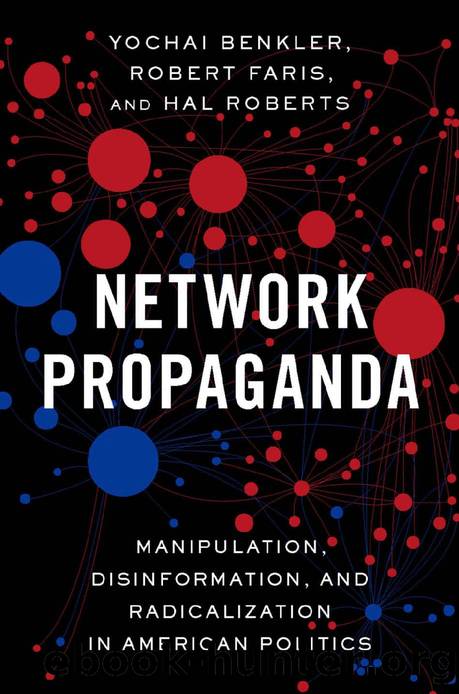Network Propaganda by Yochai Benkler & Robert Faris & Hal Roberts

Author:Yochai Benkler & Robert Faris & Hal Roberts [Benkler, Yochai]
Language: eng
Format: epub
Publisher: Oxford University Press
Published: 2018-09-17T04:00:00+00:00
Using Social Media to Suppress and Split the Democratic Vote
The indictment also alleges that the Russians used Instagram accounts they called “Woke Black” and “Blacktivist” to send messages to dissuade black voters from voting or to divert their vote to Jill Stein. If we consider Jill Stein, in the three states where her vote margin was larger than the Trump/Clinton difference—Michigan, Wisconsin, and Pennsylvania—at least according to exit polls, Stein drew 1 percent or at most 2 percent of the Black vote, less than pre-election polling suggested.90 More importantly, a pre-election Bloomberg report on the Trump campaign’s media campaign quoted an unnamed “senior official” as saying, “we have three major voter suppression operations underway,” one of which was to emphasize Clinton’s use of the term “superpredator” in 1996 to discourage black voters from showing up at the polls.91 That report described in detail a campaign, using Facebook to post messages and videos that featured the recording of Clinton’s comment, targeted using Facebook’s capabilities to make sure that “only the people we want to see it, see it.” The interviewee from the campaign boasted that “[w]e know because we’ve modeled this” that “[i]t will dramatically affect her ability to turn these people out.” And that same report quotes Steve Bannon, then running the Trump campaign, as saying, “I wouldn’t have come aboard, even for Trump, if I hadn’t known they were building this massive Facebook and data engine.” Again, as with the “voter suppression” frame, it is difficult to lend credence to the proposition that the Internet Research Agency, through Instagram posts, made a meaningful marginal impact in comparison to the directed efforts of the Trump campaign working with Facebook’s political marketing team.92
Unlike many other aspects of the allegations, however, the questions of voter suppression through targeted advertising are eminently resolvable, if we have the right disclosure system in place. Unlike Twitter, Facebook actually has the real identity of every account holder. And Facebook also has a record of the entire set of communications to which an account holder was exposed. It would not be too difficult to run a comparison between all the accounts exposed to Russian advertising interventions and accounts of otherwise demographically similar matched accounts—say, Black registered voters in Florida in the same congressional districts or smaller geographic settings—and then match the voter rolls with the real identities of the Facebook account holders. We could then know, to a high degree of confidence, whether being exposed to these Russian ads was significantly associated with lower turnout than among matched Facebook users who were not exposed to the advertising. It is precisely to conduct such investigations that it would be important to produce a record of all targeted advertising, and to make it available, under constraints appropriate to preserve the privacy of the individuals and the integrity of the voting process, for researchers who study the effect of online communications on American democracy.
Download
This site does not store any files on its server. We only index and link to content provided by other sites. Please contact the content providers to delete copyright contents if any and email us, we'll remove relevant links or contents immediately.
| Anarchism | Communism & Socialism |
| Conservatism & Liberalism | Democracy |
| Fascism | Libertarianism |
| Nationalism | Radicalism |
| Utopian |
The Secret History by Donna Tartt(16618)
The Social Justice Warrior Handbook by Lisa De Pasquale(11489)
Thirteen Reasons Why by Jay Asher(7786)
This Is How You Lose Her by Junot Diaz(5768)
Weapons of Math Destruction by Cathy O'Neil(5034)
Zero to One by Peter Thiel(4823)
The Myth of the Strong Leader by Archie Brown(4789)
Promise Me, Dad by Joe Biden(4444)
Stone's Rules by Roger Stone(4415)
Beartown by Fredrik Backman(4413)
How Democracies Die by Steven Levitsky & Daniel Ziblatt(4397)
The Fire Next Time by James Baldwin(4341)
100 Deadly Skills by Clint Emerson(4076)
A Higher Loyalty: Truth, Lies, and Leadership by James Comey(4031)
Rise and Kill First by Ronen Bergman(4012)
The David Icke Guide to the Global Conspiracy (and how to end it) by David Icke(3881)
The Farm by Tom Rob Smith(3871)
Secrecy World by Jake Bernstein(3782)
The Doomsday Machine by Daniel Ellsberg(3730)
